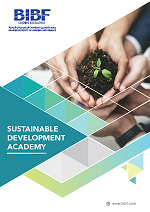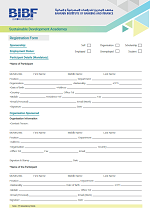1. Introduction to Sustainable Development
This course introduces the fundamental principles of sustainable development and its importance. It will examine the relationship between sustainability, resilience and business growth as well as introducing the different approaches to investing and lending (e.g. ESG, Impact, Ethical). The course will also shed light on international development initiatives such as the United Nations (UNEP FI, SDGs, UNFCCC, UNCTAD, etc.), Paris Agreement, Conference of Parties (COP), on the funding gap in achieving SDGs, and on the role of central banks (NGFS).
2. Sustainable Development Corporate Mindset
The United Nations Sustainable Development Goals (SDGs) – adopted in 2015 and focused on 5 Ps (People, Planet, Prosperity, Peace and Partnership), will shape the global social, ecological and economic agenda until 2030. It is crucial for corporate leaders to recognize and commit to the “new normal” of doing business and define ESG strategy, objectives and the roadmap. This course will explore the benefits and urgency of shifting the corporate mindset and culture to “do well while doing good” and fully internalising the commitment to re-engineer “how” business is conducted.
3. The Sustainable Development Market
This course examines ESG megatrends, the size and scope of sustainability market, key market drivers & challenges, ESG-related investment products and global investment opportunities.
4. ESG - The Changing Face of Banking
This course examines the role of financial institutions in facilitating sustainable, commercial activity. Learners will assess various case studies of banks that have adopted sustainability measures.
5. Executive overview of ESG Analysis, Evaluation & Integration
This course introduces learners to the aims and objectives of integrating ESG into a firm’s investment process. It examines the different approaches and challenges of integrating ESG analysis into a firm’s investment process – explaining how ESG complements traditional financial analysis, analysing how ESG factors affect industry and company performance, and security valuation across a range of asset classes.
6. ESG Rating and Scoring
In this course learners will gain an understanding of how Credit Rating Agencies (CRAs) and other verification agencies implement ESG scoring and validation, and the extent to which ratings and scores can be relied upon for ESG investing. The main providers of screening services or tools will be identified, examining similarities and differences in their methodologies and the aims, benefits and limitations of using them.
7. Technological Change and Sustainability
The course aims to present the role of the information technology sector (ICT) in sustainable development and the methods in which “big data” is employed toimprove the lives of millions and critical challenges that technology may face. This course examines the process in which stakeholders tackle issues that may arise in a hyper-digitized world.
8. Net Zero Banking & the Circular Economy
This course introduces the principles of transition to net zero against the backdrop of the Nationally Determined Contributions (NDCs) as set out in the Paris Agreement. It will consider the types of commitments that banks are making and the challenges in achieving them. The course will further consider the actions that banks’ clients can take to improve their sustainability footprint with respect to resource consumption and natural capital, and how banks can support them.
1. Certificate in ESG Fundamentals
This certification is designed to provide candidates with the necessary knowledge and understanding to comprehend ESG topics relevant to their jobs. Target Audience: This is suitable for all roles within financial services organisations that require a fundamental understanding of ESG Investing. Typical roles include sales and distribution, investment administration, product development, risk, advisory, investment and wealth management.
Mode of Delivery
- Option 1: Self-Paced e-Learning to be completed and after which the candidate has to complete and pass the assessment to achieve the certification.
- Option 2: Virtual Instructor-Led Training programme (1 day) and after which the candidate will have to complete and pass the assessment through the e-Learning portal to achieve the certification.
Upon successful completion, the candidate will get the ESG Fundamentals certificate
2. ESG Investment Management Applications
The certificate is designed to provide specialised knowledge to those employees who are responsible for making decisions related to investment portfolios and managing risk. The certificate helps them to integrate the requirements of ESG into their decision-making of financial investments.
Mode of Delivery
Virtual instructor-led learning 4 Modules after which the candidate has to complete and pass the assessment to achieve the certification.
Target Audience
- Investment/Treasury Professionals
- Asset/Portfolio Managers
- Investment Risk Management Professionals
3. ESG Credit Analysis Applications
The certificate is designed to provide specialised knowledge to those employees who are responsible for making decisions related to credit analysis. The certificate helps them integrate the requirements of ESG into their decision-making and implementation of the credit function of the financial sector.
Mode of Delivery
Virtual instructor-led learning 4 Modules after which the candidate has to complete and pass the assessment to achieve the certification.
Target Audience
- Corporate Bankers
- Retail Bankers
- Credit Risk Management Professionals
4. CFA Institute Certificate in ESG Investing
The CFA Institute’s Certificate in ESG Investing encompasses the benchmark knowledge and skills required by investment professionals to integrate ESG factors into the investment process.
Mode of Delivery
Virtual Instructor led Exam Revision (2 days)
Who is the Certificate in ESG Investing suitable for?
For those who want to learn more about how to analyse and integrate ESG Factors into the investment process, for e.g. sales and distribution, product development, wealth and investment management, financial advice and risk management.
Why take the Certificate?
- Recognised qualification within the industry
- Supported by the UN PRI
- Expands ESG knowledge to stay ahead in the field
- The skills learned will be applicable to all asset classes
Entry requirements
There are no formal entry criteria for this qualification, but it is strongly recommended that candidates have a solid background in the investment process, either through formal qualification or experience.
How is the exam structured?
- 100 questions, 2 hours/20 minutes
- Multiple choice questions and item set scenarios
- Computer-based exam
- Recommended study time of 130 hours












